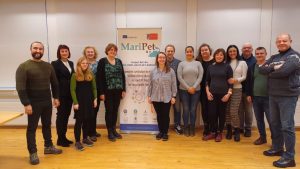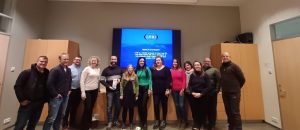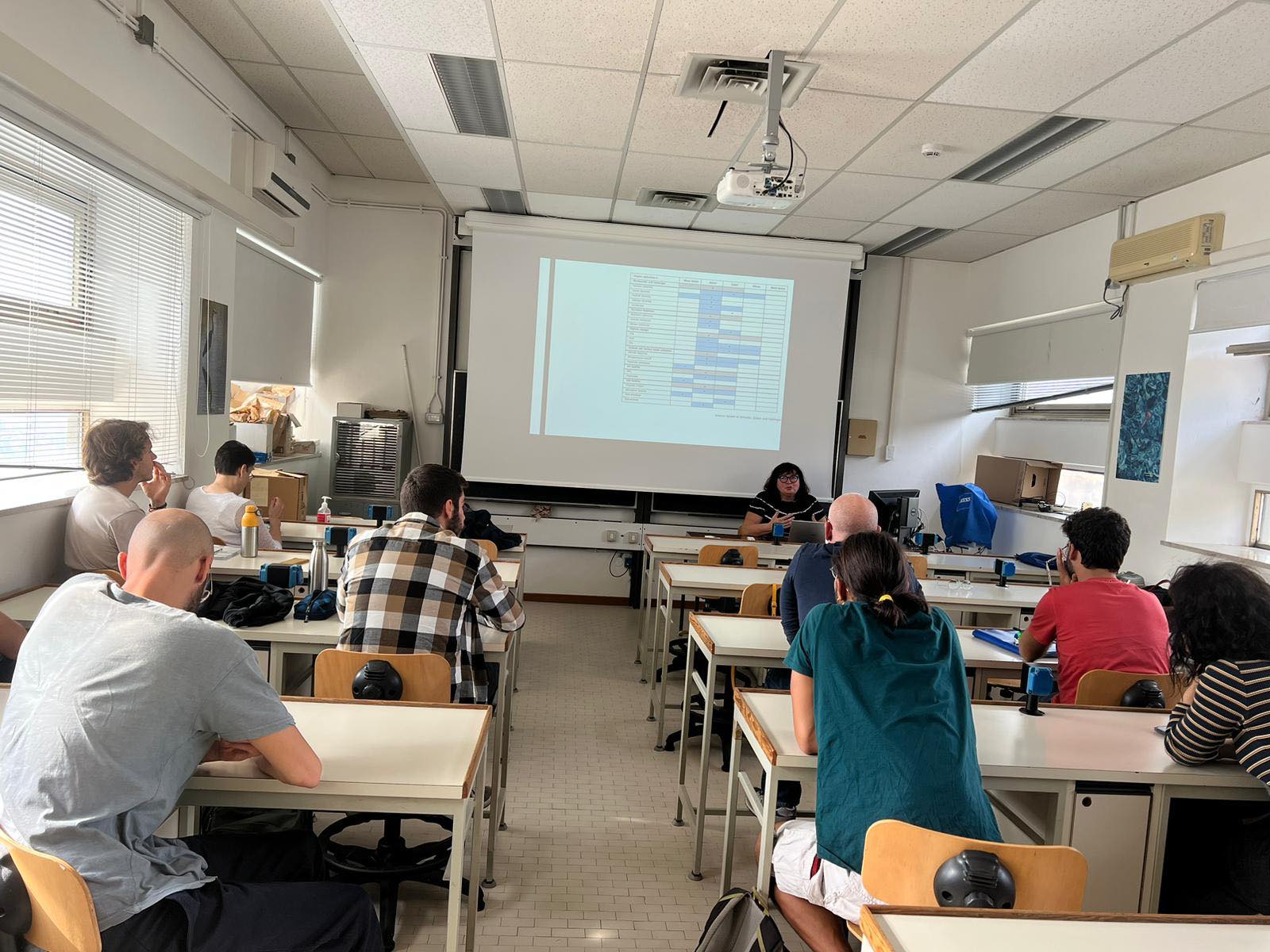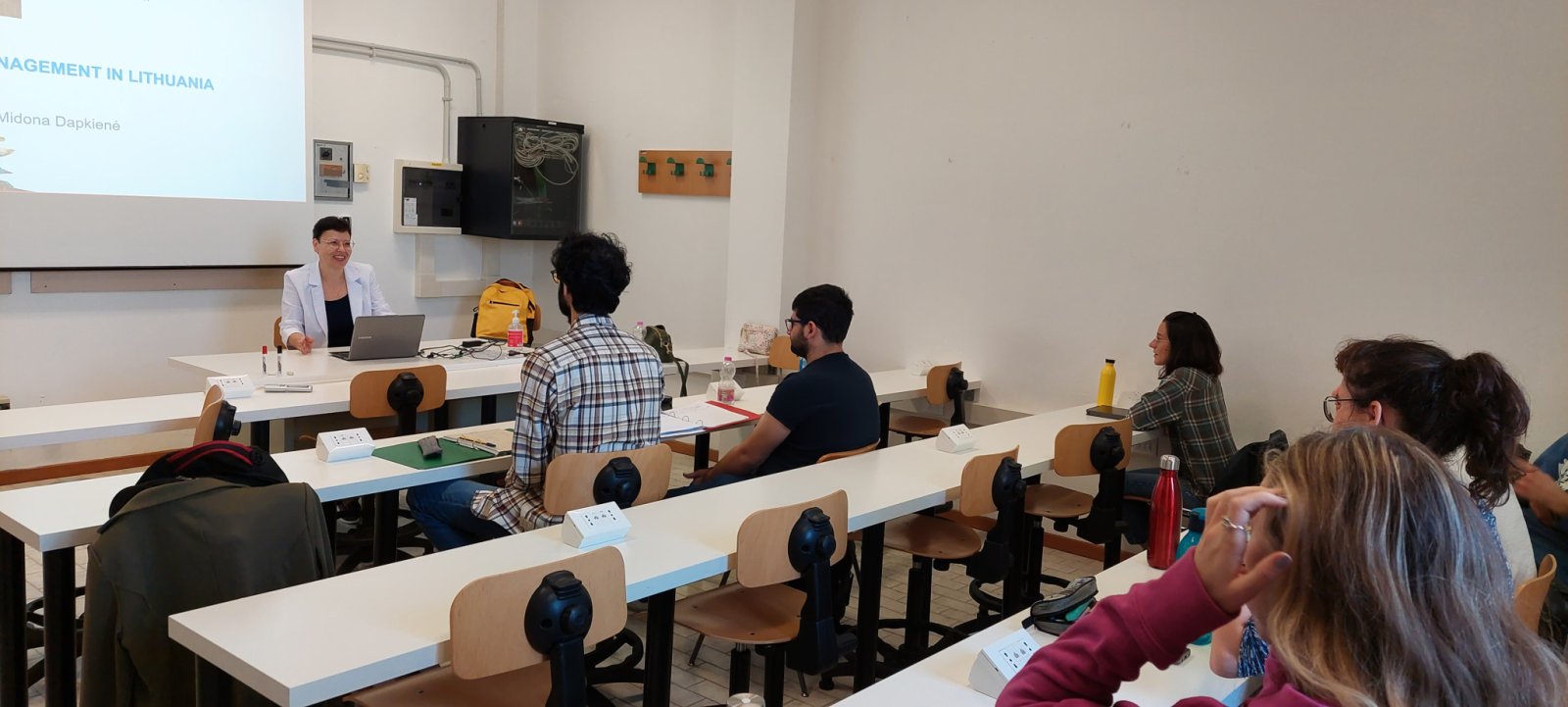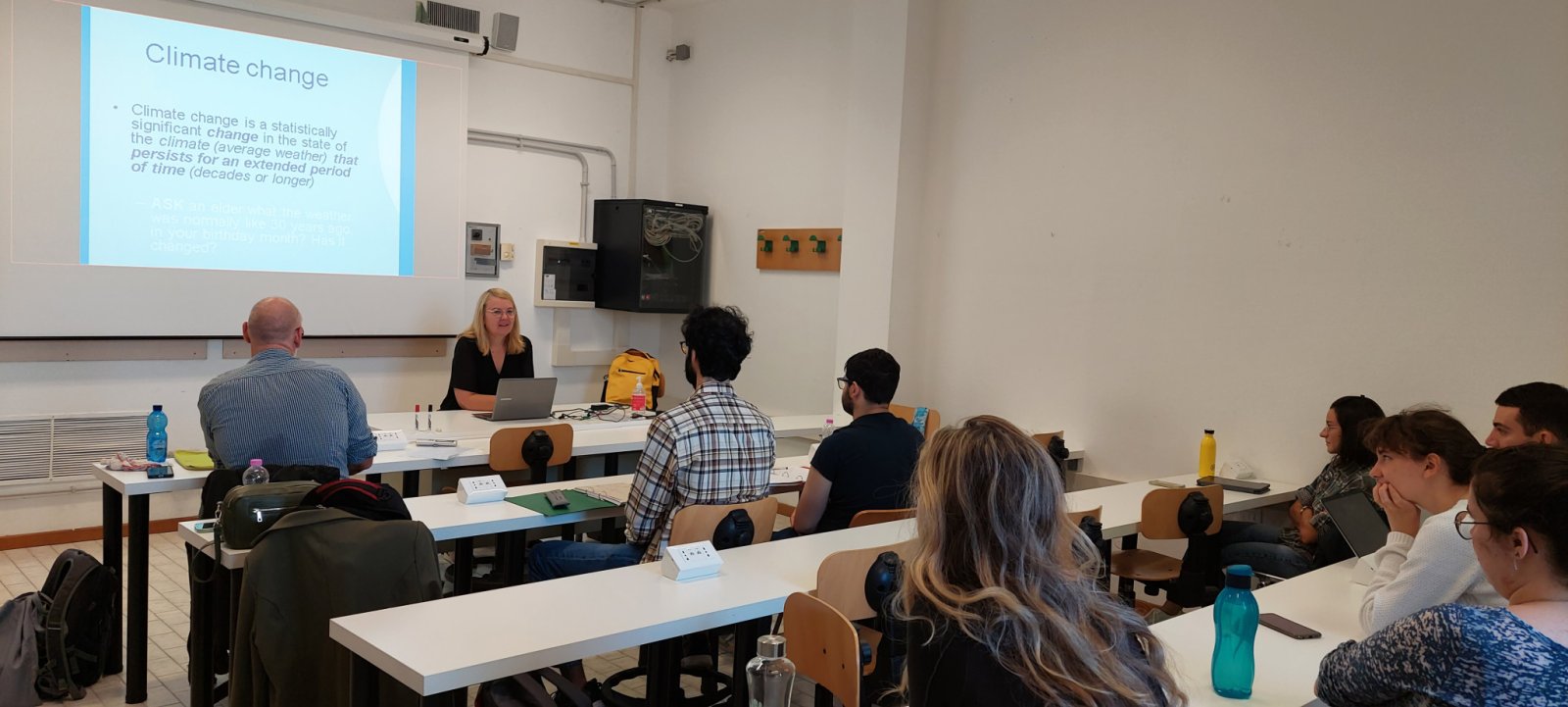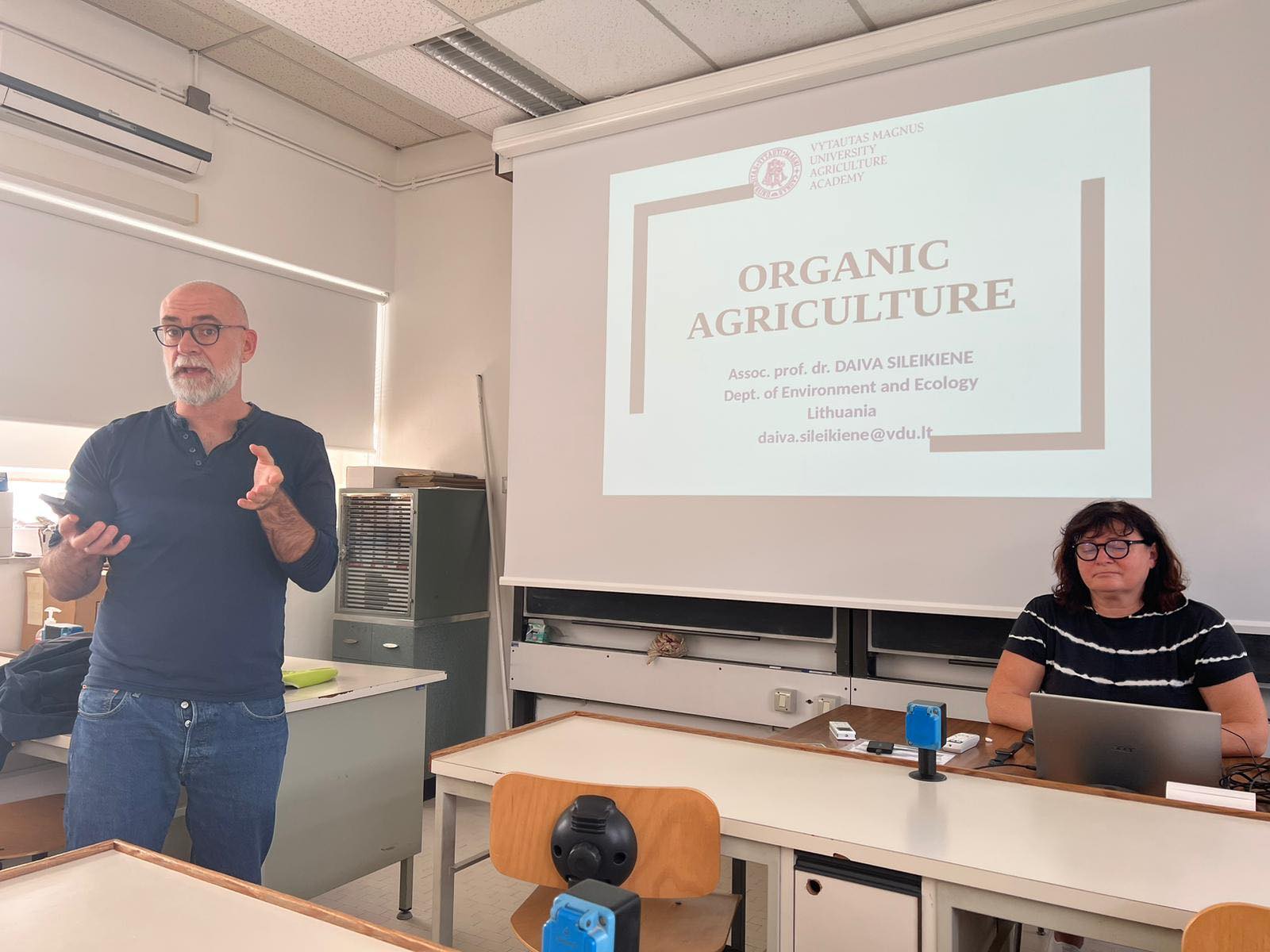The final meeting of the Erasmus+ MARIPET project in Izmir
The final (fifth) meeting of the Erasmus+ project “Innovative Curriculum to Evaluate Marine Fishery Discards as Raw Pet Food for Sustainable Europe” [MARIPET] took place on the 7th and 8th of February at the Ege University in Izmir (Turkey). Prof. dr. Virginija Dulskienė and assoc. prof. dr. Anželika Dautartė, from the Department of Environment and Ecology, took part in the meeting.
On the first day of the meeting, the implementation of the project and the dissemination events that have taken place and are planned were discussed. The focus was on the review and development of the innovative 5-module curriculum, the virtual learning environment, the platform for pet food producers, and experts and the challenges and results of the testing of the pilot curriculum. The structure, publication, and distribution of a guide/e-book on the production of pet food from fisheries discards was finalised.
The project partners met with the Rector of Ege University, prof. dr. Necdet Budak, and discussed possible perspectives for cooperation in the field of science and studies, as well as the possibilities of studies in English, and the exchange of teachers and students.
The Izmir Metropolitan Municipality (Turkey) is one of the partners in this project, and it was particularly valuable to meet with the Mayor of the Metropolitan Municipality, Tunç Soyer. The meeting focused on the global challenges of fisheries and aquaculture, the role of society in addressing these challenges, and the role of government and higher education institutions.
On the second day of the meeting, a visit was made to the Izmir Seafood Market. This market was renovated in 2017 to accommodate the wholesale trade in fish, shellfish and other seafood.
The project is coordinated by Ege University (Turkey), project partners: University of Balikesir (Turkey), University of Dubrovnik (Croatia), Agricultural University of Iceland, Izmir Metropolitan Municipality (Turkey), Norwegian University of Science and Technology, and Vytautas Magnus University.
For more information and project results are available on https://maripet.org/
Teaching aid, research paper competitions and awarding nominations of VMU AA employees are announced
We invite the employees of the VMU Agriculture Agriculture to participate in the competition of teaching aid and research papers, sharing with the community the significant work done and celebrating the achievements.
The winners will be awarded at the festive commemoration of the Day of the Restoration of Lithuania’s Independence, which will take place in the Hall of VMU Agriculture Academy central building (Studentų str. 11, Akademija, Kaunas distr.) on March 12. 1 p.m.
TEACHING AID COMPETITION REGULATIONS
TA competition is organized to initiate the sharing of experience in the development and use of advanced teaching methods and TAs among the teachers among the teachers at the VMU Agriculture Academy; to accelerate the development and use of TAs and innovative teaching techniques; to encourage the teachers to develop and improve TAs and apply them effectively in their teaching activities.
The competition is open to employees at the VMU Agriculture Academy and their teams who have developed new TAs and applied them in teaching the students at the VMU Agriculture
Academy.
Entries can be submitted under the following headings:
- Teaching publications (textbooks, course books, lecture notes, descriptions of laboratory work and exercises, other teaching publications (> 50 pages), published in print or electronic form);
- Visual aids (instruments, tools, laboratory and display benches, mockups, models,
collections of objects studied, videos, poster sets, and other tools); - Methods of organizing studies and other TAs (integrated provision of supporting teaching aids for the study subject, implementation of distance learning, implementation of other innovative study methods, etc.).
The application shall be accompanied by an extract of the minutes of the academic unit Council or a committee authorized by it, along with a recommendation, and a copy of the TA (or its location) and a description of it.
The TA description shall specify the following:
- Name of TA;
- Author(s)’ details (name, surname, faculty, institute, department, position, title, academic title and scientific degree, telephone number, email address);
- Purpose of the TA (study programme, study subject, topics within the study subject structure);
- Relevance (need, previous development of similar tools, etc.);
- Methodological compatibility with independent studies (possibilities for active learning and innovative study methods using the TA);
- Innovation (innovation in the presentation of course material) and scientific approach (use of the latest scientific information and tools, possibilities for student involvement in research);
- Visual quality of the knowledge presented and quality of the publication design (intensity of use of visual elements, strong aspects of the publication design);
- Other benefits.
Candidates’ documents for the competition shall be submitted to the coordinator for the administration of studies in the Administrative Group of the VMU Agriculture Academy dr. Rasa Čingienė (by email rasa.cingiene@vdu.lt or at VMU AA central building room 237) by 15 February.
A maximum of 3 prizes will be awarded per heading. Prizes are awarded to first-place winners, and certificates of appreciation are awarded to second and third-place winners. The prize fund shall be allocated by the Chancellor of the VMU Agriculture Academy.
Contact for more information: dr. Rasa Čingienė rasa.cingiene@vdu.lt, VMU AA central building room 237.
RESEARCH PAPER COMPETITION REGULATIONS
RP competition is organized to encourage the teachers, researchers, and PhD students at the VMU Agriculture Academy, to conduct research and disseminate the results thereof, to contribute to the enhancement of the scientific, social and economic environment of Vytautas Magnus University and of the whole country; to select, promote, and reward the best researchers and research groups at the VMU Agriculture Academy.
The competition is open to teachers, researchers, and PhD students of the VMU Agriculture Academy.
Entries can be submitted under the following headings:
- research group category (it is recommended that the number of authors of a submitted research paper should not exceed 4 and that each publication should be authored by at least two authors from the research group participating in the competition);
- international researcher’s category (a researcher working on a research project in collaboration with researchers from other countries);
- category of the young researcher, doctoral student, or their team (applicants must be aged 35 or younger, hold a PhD granted no earlier than 5 years ago, not including parental leave).
The RP competition is open to collections of scientific output on a common topic for the last 2 calendar years, which may include:
- scientific monographs, parts of scientific monographs, scientific studies;
- patented scientific output, registered plant and animal varieties;
- scientific publications;
- oral presentations at plenary sessions of scientific international conferences.
The RP shall be submitted to the competition together with the following:
- Extract from the minutes of the Council of the academic unit or a committee authorized by it, with a recommendation, which shall include the title of the submitted RP, the author(s) and the creative contribution that shall be assessed in proportion to the number of authors or on the basis of a joint declaration signed by the authors;
- A brief description (up to 1 page) of the research paper or collection of the output, indicating the title of the RP, the components of the submitted research paper or collection of the output, and highlighting the most important aspects of the RP that are relevant to the competition.
- Information about the author(s) of the RP (name, surname, date of birth, position, scientific title and degree, scientific achievements, list of major scientific outputs signed by a library staff member, contribution index, telephone number, email address).
The competition is not open to winners of the previous year’s RP competition.
Candidates’ documents for the competition shall be submitted to the Scientific Activity Coordinator dr. Algis Kvaraciejus (by email algis.kvaraciejus@vdu.lt or at VMU AA central building room 227) at the VMU Agriculture Academy by 15 February.
A maximum of 5 prizes will be awarded to the winners of the RP competition: a maximum of 3 prizes shall be awarded in the 1st category and 1 prize in the 2nd and 3rd categories each.
Contact for more information: dr. Algis Kvaraciejus, algis.kvaraciejus@vdu.lt VMU AA central building room 227.
THE SUBMISSION OF NOMINATIONS
The Nominations are an incentive tool to encourage the involvement of the employees and students of the VMU Agriculture Academy in further development of the quality of studies, research and scientific services, the creation of a motivating working environment, and fostering of culture and values.
Nominations are open to employees (or a group of employees) and students of the VMU Agriculture Academy who have an impeccable reputation. The employee or student who has violated the VMU Code of Academic Ethics and/or work discipline shall not be eligible for the Nomination.
Types of the VMU Agriculture Academy Nominations and the Nomination criteria:
- Nomination “Scientific Achievement of the Year” is awarded to a member or group of members of the community of the VMU Agriculture Academy for receiving significant national and/or international awards for research and experimental development (R&D) activities. One candidate is submitted by each academic and non-academic division.
- Nomination “Project of the Year” is awarded to a member or group of members of the community of the VMU Agriculture Academy for active project activities, the impact of the winning project on the region, country, and society at national and/or international level. One candidate is submitted by each academic and non-academic division.
- Nomination “Researcher of the Year” is awarded to students and other members of the academic community at all levels of the VMU Agriculture Academy, except those holding a doctoral degree, for their active scientific research activities and results of scientific achievements. The Nomination may be awarded to the same member of the academic community once every three calendar years. One candidate is submitted by each academic division.
- Nomination “Employee of the Year” is awarded to an employee of the community of the VMU Agriculture Academy who is indirectly involved in activities related to studies and research, for significant initiatives for the development of the VMU Agriculture Academy, outstanding diligence and loyalty to the VMU Agriculture Academy. The Nomination may be awarded to the same member of the community of the VMU Agriculture Academy once every three calendar years. The candidates are submitted by the administration, academic, and non-academic divisions of the VMU Agriculture Academy.
- Nomination “Partnership of the Year” is awarded to a member of the community of the VMU Agriculture Academy for the establishment, development, and expansion of close and significant cooperation with social and business partners, taking into account the importance of the cooperation, the support provided by the partner, or any other significant achievements at the VMU Agriculture Academy. The Nomination may be awarded to the same member of the community of the VMU Agriculture Academy once every three calendar years. The candidates are submitted by the administration, academic, and non-academic divisions of the VMU Agriculture Academy.
- Nomination “Teacher of the Year” is awarded to a member of the academic community of the VMU Agriculture Academy whose main job functions are related to the VMU Agriculture Academy, for the following results: students’ objective satisfaction with the taught subject, advanced pedagogical activity, work with the Erasmus+ students, resources used for the taught subjects, innovative approach in teaching, teacher’s activity and partnership with other study and research institutions, promotion of study programmes at the VMU Agriculture Academy among pupils and the public, and supervision of students’ research papers. The Nomination may be awarded to the same teacher once every three calendar years. One candidate is submitted by each Faculty.
- Nomination “Student of the Year” is awarded to a first-, second- or third-cycle student at the VMU Agriculture Academy for significant achievements in learning, research, organizational or social activities. The same student may be nominated once during the entire study period. One candidate is submitted by each Faculty, taking into account the opinion of student representatives.
- Nomination “Researcher’s International Mobility of the Year” is awarded to researchers at the VMU Agriculture Academy with and without a doctoral degree, to teachers, scientific workers, and doctoral students for their activity within the framework of international visits. The Nomination may be awarded to the same researcher once every three calendar years. One candidate is submitted by each academic and non-academic division.
- Nomination “Student’s International Mobility of the Year” is awarded to a first- or second-cycle student at the VMU Agriculture Academy for active participation in international exchange (internships, short-term courses, studies). The same student may be awarded the Nomination once during the entire study period. One candidate is submitted by each Faculty.
- Nomination “Ambassador of the Year” is awarded to a member or group of members of the community of the VMU Agriculture Academy for active promotion of study and research activities, events at national and/or international level. One candidate is submitted by each academic and non-academic division
First international partners’ meeting of the Erasmus+ project “The digital Blue Career to overcome the Carbon Crisis – Innovations in Aquaculture Curriculum” [DiBluCa] in Kaunas
The first partner meeting of the international Erasmus+ project “The digital Blue Career to overcome the Carbon Crisis – Innovations in Aquaculture Curriculum” [DiBluCa] (No. 2023-1-LT01-KA220-HED-000154247) took place on 23-24 January at Vytautas Magnus University Agriculture Academy (VMU AA). The project partners are Balikesir University (Turkey), University of Dubrovnik (Croatia), Odesa National University of Technology (Ukraine), University of Thessaly (Greece), coordinator – VMU AA.
COVID-19 and the crisis of the war in Ukraine have highlighted the value of digital education in Europe; the DiBluCa project will develop an innovative higher education curriculum on water sustainability, fisheries now and in the future, which will contribute to ensuring sustainable industry and long-term employment.
The project will be implemented in phases: identification of sector needs, development and/or updating of the curriculum and development of learning materials. The project includes international partner meetings, a digital portal with user-friendly e-learning and best practice modules. An innovative Aquaculture Higher Education Handbook on Tackling Global Warming will be published in English; the e-book will be available in all languages of the project partners.
Project outcomes: adapted higher education and training curricula for future aquaculture needs, long-term employment of aquaculture professionals, increased number of university students, changing attitudes and trends, improvement of the aquaculture sector, aquaculture training knowledge and skills, development of integrated training materials, interactive e-book, international conference and project dissemination events.
During the meeting the main guidelines for the implementation of the project activities were discussed. The timetable for the activities and the responsibilities of the partners were also discussed. The first result of the project was presented – experts from Balikesir University prepared questionnaires for students, teachers, and members of the target groups. These questionnaires will help to find out what the sector needs. On the second day of the meeting, cooperation opportunities were discussed with the specialists of the Lithuanian Zoo – Science Curator Kriste Stravinskaite, Head of Marketing and Education Department Aida Grockiene and Coordinator of Educational Programmes Rasa Kirkaite. Many points of contact were found, prospects for possible cooperation and plans future were discussed. The next meeting of foreign partners will take place in Volos, Greece, at the beginning of June.
The project will run from 01.11.2023 to 31.10.2025.
The 4th meeting of the Erasmus+ MARIPET project in Reykjavik
The fourth meeting of the Erasmus+ project “Innovative Curriculum to Evaluate Marine Fishery Discards as Raw Pet Food for Sustainable Europe” [MARIPET] took place on 28th and 29th November at the Agricultural University of Iceland in Reykjavík. Prof. Dr. Aušra Blinstrubienė, Vice-Chancellor of the Agricultural University, and Dr. Anželika Dautartė, Associate Professor at the Department of Environment and Ecology, participated in the meeting.
During the visit, the Vice-Chancellor met with Ragnheidur Inga Thorarinsdottir, Rector of the Icelandic University of Agriculture, to look into prospective scientific and educational collaboration.
Dissemination activities are scheduled to occur in all project nations in January 2024, as stated on the first day of the meeting, which focused on the completion of the project. The unique five-module curriculum, the online learning platform, the experts’ and producers’ platform for pet food, and the pilot testing of the curriculum in the first week of February were the main points of discussion. The manual/e-book on producing pet food from discarded fish has been finished in terms of organisation, publishing, and distribution.
On the second day of the meeting, a visit was made to the LYSI company. Founded in 1938, LYSI is one of the world’s largest producers of marine oil for human consumption and a pioneer in fish oil production. Today, more than 95% of LYSI’s energy consumption comes from renewable sources. LYSI is one of the main actors in Iceland’s policy to achieve full utilisation of all fishing industry inputs. As a leading expert in the production of valuable products from by-products and waste from traditional fish production, the company makes a significant contribution to the responsible use of natural resources.
Another site visited was BRIM, one of Iceland’s largest fishery companies. Responsible fishing and use of marine ecosystems ensures long-term interests and value creation for employees, shareholders, and society. The company measures its carbon emissions and decisions on fishing and processing here are based on economic and environmental considerations. The company is also committed to long-term carbon neutrality and has set a target to reduce its greenhouse gas intensity (tCO2/m€) by 40% between 2015 and 2030.
The project is coordinated by Ege University (Turkey), project partners: University of Balikesir (Turkey), University of Dubrovnik (Croatia), Agricultural University of Iceland, Izmir Metropolitan Municipality (Turkey), Norwegian University of Science and Technology, and Vytautas Magnus University.
The final meeting of the project will take place at Ege University on 7-8 February. The project will end on 28 February 2024.
CONFERENCE “YOUNG SCIENTIST 2024”
The 21st annual conference of young scientists “YOUNG SCIENTIST 2024” organized by the Vytautas Magnus University Agriculture Academy (VMU AA) will be held on April 11 2024 remotely. The conference is intended for the first, second and third degree students. The purpose of the conference is to involve students in scientific activities, develop the ability to publicize scientific research results, present their scientific research achievements and discuss topical issues of bioeconomy, green course, climate change, ecosystem sustainability, rational use and protection of natural resources.
There is no conference fee for students. Certificates of conference participants will be awarded to the speakers of the conference.
Speakers will be able to publish articles in the collection of articles of the conference “YOUNG SCIENTIST 2024” or in another scientific publication, for example, in the scientific journal „Agricultural engineering“ or another, after submitting articles that meet the requirements for articles in a scientific publication.
| Conference topics | Subtopics |
| Bioeconomy | Accounting and finance: challenges and opportunities |
| Bioeconomy, sustainability of agriculture and food sector | |
| Innovations and solutions in business logistics | |
| Management of agri-business and other bioeconomy business organizations | |
| Sustainable development of rural areas | |
| Biosystems engineering | Energy engineering |
| Land management | |
| Mechanical engineering | |
| Technology engineering | |
| Transport engineering | |
| Water engineering | |
| Sustainability of agricultural, forest, and water ecosystems | Agronomy |
| Food quality and safety | |
| Sustainability of agricultural ecosystems | |
| Ecosystem services | |
| Sustainable forestry | |
| Wildlife population management |
Pre-registration for the conference until February 15, 2024.
Articles for the conference “YOUNG SCIENTIST 2024” are accepted until March 8, 2024. (the link to upload the article). The articles must be prepared according to the recommendations for the authors of the articles (Annex 1_Article template, Annex 2_Authors guarantee letter).
Contests for Teaching and Training Visits under Erasmus+ Programme
International Cooperation Department invites all VMU academic and non-academic staff members to participate in the Erasmus+ contests: the contest for Erasmus+ teaching visits in Programme countries (EU/EEA countries) and the contest for Erasmus+ teaching and training visits in Partner countries (non-EU/EEA countries). The visits will be conducted in the 2023/2024 academic year.
The aim of the teaching visit is to read lectures for students of a university abroad and attract them to study under Erasmus+ at Vytautas Magnus University.
The aim of the training visit is to participate in training events held abroad (except for conferences) or do work internship (observe work, participate in training activities) in universities abroad. This activity encourages professional development of academic and non-academic staff.
The announced contests are:
- Contest for Erasmus+ teaching visits in Programme Countries (EU/EEA)
- Contest for Erasmus+ teaching and training visits in Partner Countries (non-EU/EEA)
VMU lecturers and employees are invited to apply for contests until December 1st. The selection criteria and requirements for applications are provided in the descriptions of the contests.
More information is provided by the VMU International Cooperation Department (erasmus@vdu.lt).
More information about teaching visits
More information about training visits
The final Erasmus+ „Medicinal beekeeping for beekeepers“ [MEDI-BEEB] project meeting in Kaunas
The Erasmus+ international project “Medical Beekeeping for Beekeepers” (project No. 2021-1-TRO1-KA220-VET-000034632) began on February 27, 2022. Adnan Menderes University (Turkey) is the project coordinator; project partners include the Confederation of Italian Farmers of Umbria, Onsekiz Mart University of Cenakale, Wroclaw University of Environment and Life Sciences, Aydin Province Beekeepers’ Association, and Vytautas Magnus University.
The fundamental aim of this project is to inform primarily the beekeepers about apitherapy and to train them to produce bee products under convenient conditions at conscious, healthy and definite standards. Another aim is to build up awareness in the people for the importance of the producing, storing, and marketing the products used in apitherapy.
As time is fast running out, the 4th (final) international meeting of the project partners took place on 8 and 9 November at our university. On the first day of the meeting, a review of the work that had been completed was conducted. This included the development of training materials in a virtual environment, the creation of best practice videos, and the development of a mobile application to diversify, develop and increase the value of beekeepers’ products and their application in apitherapy.
The development of training materials in MEDI-BEEB project was preceded by a thorough analysis of the needs of target groups and the current state of art in the field of production, processing and storage of products used in apitherapy.
The training programme on healthy and accurate procedures in the production of bee and bee products which are expected to be used in the treatment of some human and animal diseases is primarily addressed to beekeepers and other target groups involved in production and marketing of bee products used in apitherapy.
The e-learning course includes ten modules in the field of proper production, processing and storage of bee products used in apitherapy, such as: honey, propolis, pollen, royal jelly, bee venom, beeswax and others. In addition, the course includes information on environmental contamination of bee products, standardization and certification of bee products and legal status of bee products and apitherapy. Each module consists of 25-30 slides fully integrated with e-learning environment. Moreover, the application of e-learning course for mobile phones is developed to facilitate learning and let trainee flexibly manage his/her learning time.
The course has been enhanced with numerous manual videos and podcasts with beekeeping experts on the practical production of high-quality bee products.
The innovative and user-attractive with numerous pictures, graphs and charts handbook content reflects the content of the e- learning course and will be available both in paper form and as e- book.
The pilot testing of the materials will take place in January in all partner countries, as well as face to face and virtual Multiplier event.
The project participants met with the Urbanbee.lt team of urban beekeepers on the second day of the meeting. Urban parks and gardens have lost their most essential pollinator due to the reduction of these insects. Wind alone has been inadequate for the task. Urban beekeeping is becoming more popular among city inhabitants across the globe. Socially responsible businesses install hives on the rooftops of offices, hotels, and commercial buildings, and the honey produced by bees is sometimes given as a corporate gift. The Urbanbee.lt team offers interested businesses a full range of services, including hive installation, ongoing care and responsibility for the bees, and packaging of honey in a representative container with the company’s emblem for corporate presents. MEDI-BEEB project participants engaged in a discussion about the prospects of urban beekeeping, found common links with Urbanbee.lt team members and made contacts that will lead to new project proposals in the future.
A series of finalising activities will take place in all project partner countries in January, including pilot testing of the produced training materials as well as face to face and virtual Multiplier events. The project will be completed on February 27, 2024.
More information click https://www.medibeebe.eu/
The final Erasmus+ „Medicinal beekeeping for beekeepers“ [MEDI-BEEB] project meeting in Kaunas
The Erasmus+ international project “Medical Beekeeping for Beekeepers” (project No. 2021-1-TRO1-KA220-VET-000034632) began on February 27, 2022. Adnan Menderes University (Turkey) is the project coordinator; project partners include the Confederation of Italian Farmers of Umbria, Onsekiz Mart University of Cenakale, Wroclaw University of Environment and Life Sciences, Aydin Province Beekeepers’ Association, and Vytautas Magnus University.
The fundamental aim of this project is to inform primarily the beekeepers about apitherapy and to train them to produce bee products under convenient conditions at conscious, healthy and definite standards. Another aim is to build up awareness in the people for the importance of the producing, storing, and marketing the products used in apitherapy.
As time is fast running out, the 4th (final) international meeting of the project partners took place on 8 and 9 November at our university. On the first day of the meeting, a review of the work that had been completed was conducted. This included the development of training materials in a virtual environment, the creation of best practice videos, and the development of a mobile application to diversify, develop and increase the value of beekeepers’ products and their application in apitherapy.
The development of training materials in MEDI-BEEB project was preceded by a thorough analysis of the needs of target groups and the current state of art in the field of production, processing and storage of products used in apitherapy.
The training programme on healthy and accurate procedures in the production of bee and bee products which are expected to be used in the treatment of some human and animal diseases is primarily addressed to beekeepers and other target groups involved in production and marketing of bee products used in apitherapy.
The e-learning course includes ten modules in the field of proper production, processing and storage of bee products used in apitherapy, such as: honey, propolis, pollen, royal jelly, bee venom, beeswax and others. In addition, the course includes information on environmental contamination of bee products, standardization and certification of bee products and legal status of bee products and apitherapy. Each module consists of 25-30 slides fully integrated with e-learning environment. Moreover, the application of e-learning course for mobile phones is developed to facilitate learning and let trainee flexibly manage his/her learning time.
The course has been enhanced with numerous manual videos and podcasts with beekeeping experts on the practical production of high-quality bee products.
The innovative and user-attractive with numerous pictures, graphs and charts handbook content reflects the content of the e- learning course and will be available both in paper form and as e- book.
The pilot testing of the materials will take place in January in all partner countries, as well as face to face and virtual Multiplier event.
The project participants met with the Urbanbee.lt team of urban beekeepers on the second day of the meeting. Urban parks and gardens have lost their most essential pollinator due to the reduction of these insects. Wind alone has been inadequate for the task. Urban beekeeping is becoming more popular among city inhabitants across the globe. Socially responsible businesses install hives on the rooftops of offices, hotels, and commercial buildings, and the honey produced by bees is sometimes given as a corporate gift. The Urbanbee.lt team offers interested businesses a full range of services, including hive installation, ongoing care and responsibility for the bees, and packaging of honey in a representative container with the company’s emblem for corporate presents. MEDI-BEEB project participants engaged in a discussion about the prospects of urban beekeeping, found common links with Urbanbee.lt team members and made contacts that will lead to new project proposals in the future.
A series of finalising activities will take place in all project partner countries in January, including pilot testing of the produced training materials as well as face to face and virtual Multiplier events. The project will be completed on February 27, 2024.
More information click https://www.medibeebe.eu/
Visit of teachers of VMU AA to University of Trieste in Italy
The teachers of Vytautas Magnus University Agriculture Academy (VMY AA) assoc. prof. dr. Midona Dapkienė (Department of Water Engineering, Faculty of Engineering), prof. dr. Laima Česonienė and assoc. prof. dr. Daiva Šileikienė (Department of Environment and Ecology, Faculty of Forest Sciences and Ecology) visited University of Trieste according to Erasmus+ Mobility agreement on October 9th to 12th 2023.
The University of Trieste is a public research university in Trieste in the Friuli-Venezia Giulia region in northeast Italy. The University consists of 10 departments, has a wide and almost complete range of university courses and has about 15,000 students and 1,000 professors.
The teachers of VMU Agriculture Academy presented their University and gave the lectures for students of the master degree programmes in Global Change Ecology and Sustainability as well as in Management of Marine and Coastal Environmental Science. The students of the Environmental and Resource Economics (a master degree programme in Economy) and the PhD students in Circular Economy (a PhD programme in Economy) were invited to some lectures. The topics of lectures were as follows: influence of climate change on surface water status, agricultural activity impact on water quality, wastewater treatment and reuse for soil irrigation, water management in Lithuania, organic agriculture, environmental policy and Green Deal. Masters as well as PhD students also were given a possibility to connect to seminars online. All lectures were recorded and will be used in various training courses.
The representatives of VMU Agriculture Academy had an opportunity to meet the professors Giovanni Bacaro (a coordinator of the master degree programme), Chiara Manfrin, Stefano Martellos, Giuseppe Borruso and Matteo Carzedda and to discuss the possibilities of the joint projects as well as to familiarize with the study process and reasearch at the Department of Life Sciences.
11th International Scientific Conference “Rural Development 2023: Bioeconomy for The Green Deal”
We kindly invite You to the 11th International Scientific Conference “RURAL DEVELOPMENT 2023: Bioeconomy for the Green Deal”, which will take place in Vytautas Magnus University Agriculture Academy (Lithuania), 26-28 September, 2023.
This conference is aimed at providing interdisciplinary scientific discussion, presenting new ideas for rural development processes in the context of Bioeconomy, Climate Change, Innovations and Social Progress.
The main topics of Conference sessions:
- Agro-innovations and Food Technologies;
- Biosystems Engineering and Environmental Integrity;
- Multifunctional Approach for Sustainable Use of Bio-Resources;
- Social Research for Sustainable Bioeconomy and Climate Change.
Business and Science Forum “Connecting the Dots: A Roadmap for Lithuanian Bioeconomy Development” will be held during the Conference.
Conference keywords: Innovations, Integrity, Bio-resources, Well-being.
Important dates and deadlines:
- Until September 15th, 2023 – registration (extended)
- Until September 26th, 2023 – article submission (extended)
- Until September 10th, 2023 – payment of participation fee
- January, 2024 – publishing of the Conference proceedings
| Participation fee | In person (EUR) | Online (EUR) |
| Authors until August 27th | 250 | 170 |
| Authors after August 27th | 300 | 220 |
| PhD students | 125 | 100 |
| Non-authors | 150 | Free of charge |
Participation fee in person covers not only the Conference proceedings, but also coffee breaks, lunches and gala dinner. The costs of accommodation, cultural (social) programme and transport should be covered by the participants of the Conference.
Speakers of the conference pay the participation fee after receiving information about the confirmation of the topic of the presentation.
Certificates of participants will be sent by e-mail after the conference.
More information about the Conference
Online Registration on the Conference website.
Information for authors.
New design, more user-friendly Conference website: https://www.ruraldevelopment.lt/
Conference e-mail: rural.development@vdu.lt
 This Conference starts a cycle of events dedicated to the 100th anniversary of the Vytautas Magnus University Agriculture Academy.
This Conference starts a cycle of events dedicated to the 100th anniversary of the Vytautas Magnus University Agriculture Academy.
- About
- About Agri-Food BM programme
- Academic infrastructure units
- All events
- All news
- Aquaculture center
- Archives
- Biosystems Engineering
- Center of Animal husbandry selections, breeding values and dissemination
- Centre of Biosystems Engineering, Biomass Energetics and Water Engineering
- Circular Biobased Economy
- Climate change
- Contacts
- Contacts
- Events
- Events archive
- Faculties
- For business and society
- Innovative products
- International Cooperation
- International projects
- Joint Research Centre of Agriculture and Forestry
- Journal “Human and Nature Safety”
- Laboratory of Technology Safety
- Laboratory services
- Living Environment
- More labs
- News
- Project
- QUALS project description
- Research
- Research areas
- Scientific events
- Scope
- Sitemap
- Studies
- Study programmes
- Technology Transfer & Commercialization
- THE ROLE OF ORGANISATION IN THE PROJECT
- THE ROLE OF ORGANISATION IN THE PROJECT
- THE ROLE OF ORGANISATION IN THE PROJECT
- The Study Process
- Žemės ūkio žinių ir inovacijų sistemos klasteris





